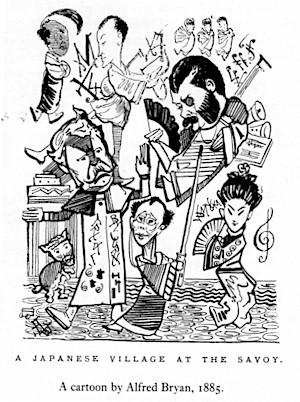|
 As usual with theatrical productions, the version of The Mikado that we will be performing differs somewhat from that performed on opening night, March 14, 1885. Luckily, that first performance did include a number, which Gilbert had decided to cut: the Mikado's song, "My Object All Sublime." Perhaps he was worried that the theme of the song was too similar to Ko-Ko's little list, with society offenders whose punishment should fit the crime. (Those with Schirmer scores will know that both lists included the now-offensive "n" word to describe the wildly popular blackface minstrels.) Whatever the reason, the cast members protested in a body when they learned of the decision, as viewers of Topsy Turvey may remember, and Gilbert relented. The opening night encore for the song vindicated the cast's actions.
As usual with theatrical productions, the version of The Mikado that we will be performing differs somewhat from that performed on opening night, March 14, 1885. Luckily, that first performance did include a number, which Gilbert had decided to cut: the Mikado's song, "My Object All Sublime." Perhaps he was worried that the theme of the song was too similar to Ko-Ko's little list, with society offenders whose punishment should fit the crime. (Those with Schirmer scores will know that both lists included the now-offensive "n" word to describe the wildly popular blackface minstrels.) Whatever the reason, the cast members protested in a body when they learned of the decision, as viewers of Topsy Turvey may remember, and Gilbert relented. The opening night encore for the song vindicated the cast's actions.
The writing team did make a number of changes, however, to tighten up the show after its first performance. The little list song was among those changes. Originally it came after the news was received that the Mikado was on his way to Titipu, doubtless wanting an execution to take place. Since there was no male chorus on-stage at that point, Ko-Ko originally sang his own refrain: "As a victim must be found, if you only look around, there are criminals at large (and enough to fill a barge), whose swift decapitation would be hailed with acclamation, if accomplished by the nation at a reasonable charge." Minus the refrain and plus the men's chorus, the song now works very well almost immediately after Ko-Ko's arrival.
Yum-Yum's beautiful solo, "The Sun Whose Rays," originally followed "So Please You, Sir, We Much Regret," after the ladies and Pooh-Bah had left, but before Nanki-Poo entered. Leonora Braham, the soloist, mentioned to Sullivan that she had difficulty doing justice to the song in her breathless state from cavorting around the stage in that up-tempo number. So Sullivan found a more appropriate place for her solo early in Act II, where it seems it should always have been sung.
When Nanki-Poo does re-enter in Act I, he and Yum-Yum sing a duet, which has been modified and shortened. Yum-Yum originally sang the first stanza, "Were I not to Ko-Ko plighted...", which concluded with the lines, "I would say, `O gentle stanger, press me closely to thy heart, sharing every joy and danger, we will never part!'" Both sang, "We will never part!" twice. Then Yum-Yum continued, much as she still does, with "But as I'm to marry Ko-Ko, to express my love con fuoco would distinctly be no gioco, etc.," and then concluding her section of the duet with "So I will not say, `O stranger, press me closely...' Clearly understand, I pray, this is what I'll never say - this - oh, this - oh, this - oh, this - this is what I'll never say." Nanki-Poo then began his reply with "Were you not to Ko-Ko plighted, I should thrill at words like those. Joy of joys is love requited, love despised is woe of woes. I would merge all rank and station..." and the rest of the song continued as it now does.
Other than some small changes in dialogue, the only other major alteration was an addition to the Act II Finale, which originally began with "The threatened cloud has passed away..." Leonora Braham in her reminiscences suggests that most of the changes were made at a Sunday morning rehearsal following opening night! But these were professional singer-actors whose job it was to handle such emergencies. Consider that Sullivan's first music wasn't composed until December 21, 1884, less than three months before opening night. (Forget about starting rehearsals in September!) It was, incidentally, "Three Little Maids," encored three times on opening night, and still a fan favourite. That the three young women were almost sick with stage-fright while waiting interminably back-stage for their entrance probably made their pleasure at its welcome reception even greater.
One final artistic decision is worth mentioning. In our musical scores, Pish-Tush sings the bass part in the madrigal, "Brightly Dawns Our Wedding Day." Frederick Bovill, the role's originator, apparently had difficulty hitting the low note at the end, and a bass chorus member, listed as Go-To, was recruited as lord-high-substitute for this one number. Luckily, at our auditions, we discovered that Max Craddock had no such limitations!
|



 As usual with theatrical productions, the version of The Mikado that we will be performing differs somewhat from that performed on opening night, March 14, 1885. Luckily, that first performance did include a number, which Gilbert had decided to cut: the Mikado's song, "My Object All Sublime." Perhaps he was worried that the theme of the song was too similar to Ko-Ko's little list, with society offenders whose punishment should fit the crime. (Those with Schirmer scores will know that both lists included the now-offensive "n" word to describe the wildly popular blackface minstrels.) Whatever the reason, the cast members protested in a body when they learned of the decision, as viewers of Topsy Turvey may remember, and Gilbert relented. The opening night encore for the song vindicated the cast's actions.
As usual with theatrical productions, the version of The Mikado that we will be performing differs somewhat from that performed on opening night, March 14, 1885. Luckily, that first performance did include a number, which Gilbert had decided to cut: the Mikado's song, "My Object All Sublime." Perhaps he was worried that the theme of the song was too similar to Ko-Ko's little list, with society offenders whose punishment should fit the crime. (Those with Schirmer scores will know that both lists included the now-offensive "n" word to describe the wildly popular blackface minstrels.) Whatever the reason, the cast members protested in a body when they learned of the decision, as viewers of Topsy Turvey may remember, and Gilbert relented. The opening night encore for the song vindicated the cast's actions.